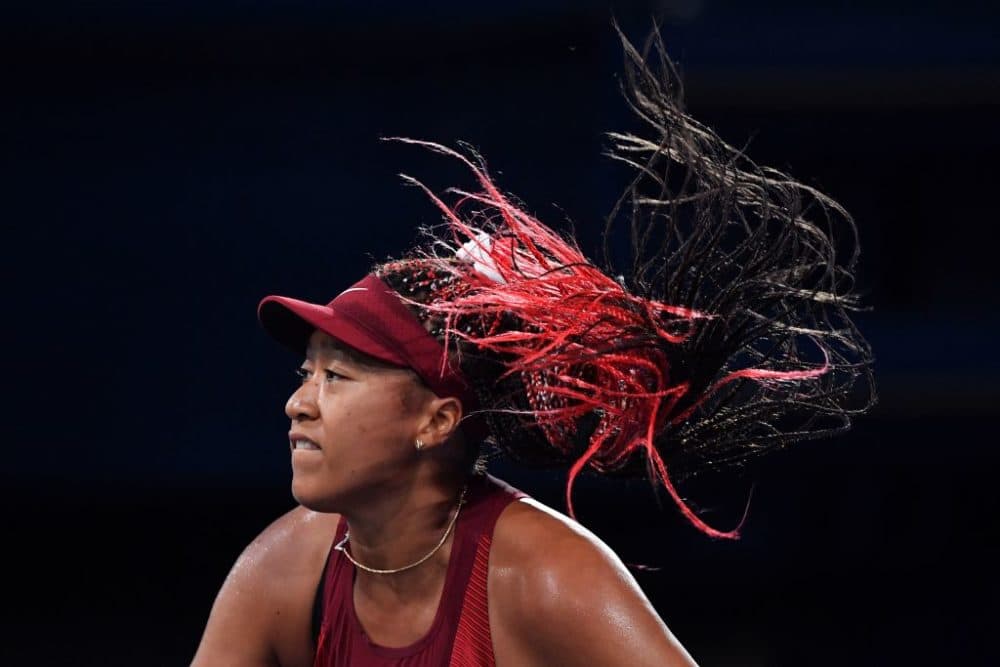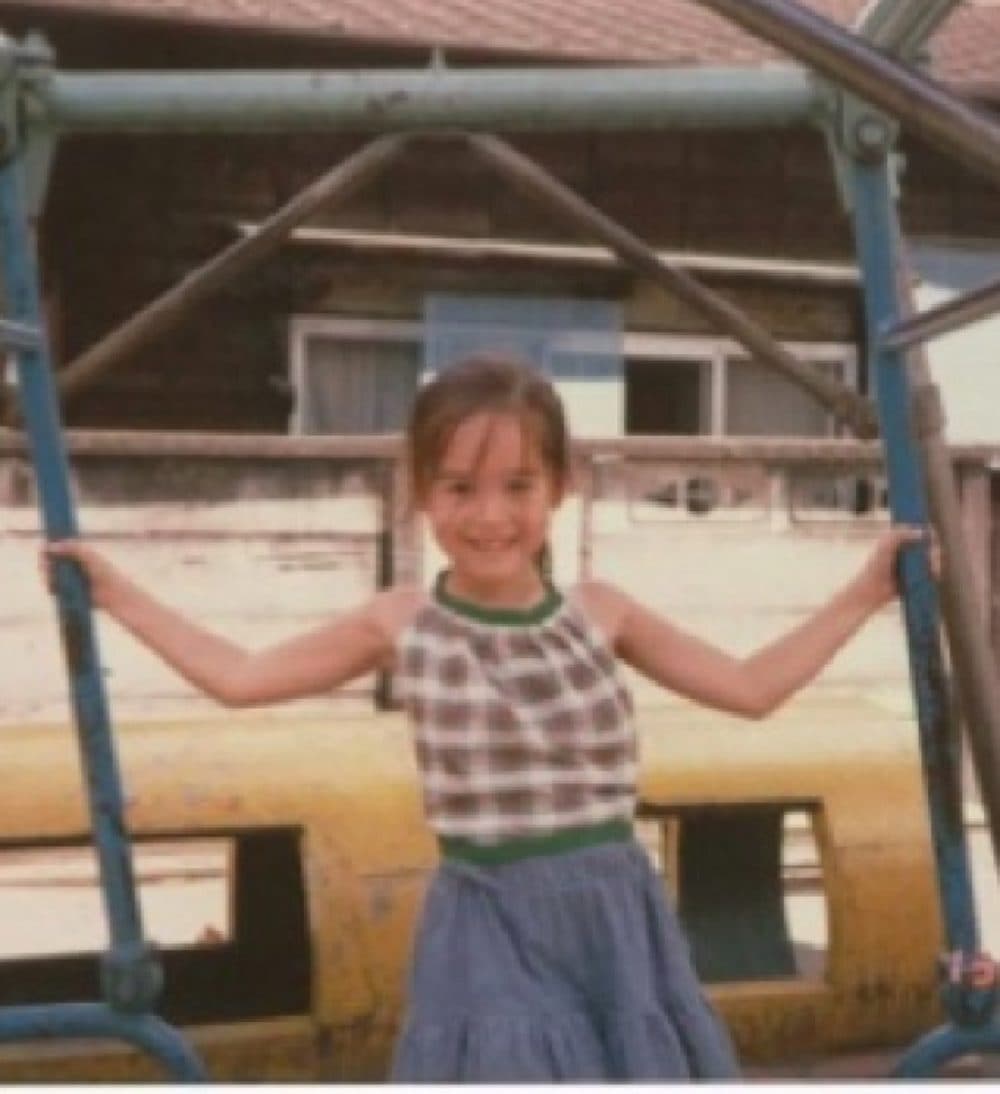Advertisement
Commentary
The 'Simultaneity' Of Naomi Osaka

I have been conflicted about whether to watch the Olympics. As the Japanese protest in the streets, many of my American friends are eschewing broadcasts because of pervasive anti-Blackness leading up to the games. There was the anti-Semitism of the opening ceremony director. And there’s already a movement to boycott next year’s winter Olympics in Beijing because of China’s genocide of Uygur Muslims. The Olympics have a long history of displacing the poor. Just ask Tokyo residents Kohei Jinno and others, evicted from their homes before the 1964 Games and this year.
We are still in the midst of a global pandemic, with regions across Japan declaring states of emergency. Over 80% of Japanese don’t support the games, my aunts and cousins among them. In Tokyo, where COVID-19 infection rates again surge, and the vaccine rollout has been slow, my Aunt Mari (in her 80s), is between her first and second dose. My cousin (in her 50s) awaits her first shot.
Scrolling Instagram the day after the summer games opened, I saw Naomi Osaka’s post: a clip of her lighting the Olympic cauldron. Osaka, unlike me, was born in Japan, though both of us have been raised largely in the U.S. My parents, knowing I would be forced to choose eventually, never applied for my Japanese passport. I wonder what Osaka felt as she gave up her U.S. citizenship at age 21 (Japan does not allow dual citizens after 22)? Though the decision was informed by her desire to represent the country of her birth at the Olympics, I like to believe it was also a reclamation. As Osaka’s mother said, “Quite simply, Naomi and her sister Mari have always felt Japanese.”
My mother, born and raised just two miles from where Tokyo’s Olympic Stadium stands, has now lived longest in New York City, my hometown. Until I turned 16, she and I spent every summer in Tokyo. Those summers, and my subsequent annual visits — during college spring breaks, on trips with my now husband to meet family, as a new mother with babies in tow — are woven into the fabric of who I am.

Pre-pandemic, I had been planning a month-long visit to Tokyo for our family, to give my daughters, who very much identify with their Japaneseness, a taste of what I had: lazy, humid days spent reading books and writing letters, sleeping in a futon next to my mother and great-aunt in the tatami sitting room of my grandparents’ house. We’d penciled it in for summer 2021, with American friends hoping to sync up their visits and benefit from my translating and tour guiding.
That trip, like so many other plans, was canceled because of the pandemic. But seeing Tokyo now, and the swirling stories of identity, feels like an opportunity to reflect.
Osaka withdrew from the French Open earlier this year, and skipped Wimbledon (she was also upset in the third round of the Olympic tournament this week). Those who question why she was chosen to light the cauldron, or who criticize Simone Biles’ decision to withdraw from competition, uphold a dangerous status quo. To confront our anti-Blackness, we cannot just cheer for Osaka, Biles and others when they are competing at their best, we must center their humanity. In putting their mental health first (Biles cited Osaka as an inspiration), and pushing back on the notion that their labor and victory is owed to anyone, both athletes embody truths more vital than any medal or title: there is strength in vulnerability; sometimes leadership is knowing when to step aside. I have learned so much from the boundaries they continue to draw.
A concept, one I learned in graduate school and evoke daily, is simultaneity. Not the physics term, rather the notion that two seemingly contradictory things can be true at the same time. Both/and.
Advertisement
The I.O.C must be held accountable and be reformed, and my daughters benefit from looking up to and rooting for Naomi Osaka, Simone Biles and countless others competing in Tokyo. I can educate my girls about the ever-present hypocrisy, anti-Blackness and misogyny of the games, and feel deeply seen while watching Osaka climb the figurative Mount Fuji, torch in hand.
Watching Osaka reinforced for me that she will not be hammered down. She speaks out when she wants to, and stays silent when it is an act of self care.
I wasn’t planning to watch the opening ceremony. But knowing that Osaka would be the one to light the Olympic cauldron, I joined my daughters. My mother stood next to us, becoming animated when homerun legend Sadaharu Oh appeared alongside Shigeo Nagashima (who I remember as the Yomiuri Giants’ manager, when I used to watch games on TV with my grandfather), leaning heavily on Hideki Matsui, who rounded out the trio of Japanese baseball superstars. Matsui was a Giant too, for nearly a decade, before moving to the U.S. to join my mother’s beloved New York Yankees.
As the broadcasters tried to build up the suspense around who would receive the flame last and be tasked with transporting it to the cauldron, Osaka appeared, wearing red and white box braids (a nod to the Japanese flag) and the expression I have come to know well: of confidence and uncertainty, of sure footing while trailblazing. Her simultaneity.
Osaka wrote of the lighting:
Undoubtedly the greatest athletic achievement and honor I will ever have in my life. I have no words to describe the feelings I have right now but I do know I am currently filled with gratefulness and thankfulness.
The sight brought me back to Tokyo summers. I felt the warmth of my futon and my family’s acceptance. I tasted the love, and the flecks of egg, in the dishes my grandmother stewed for us. And, for every person who marveled at my fluent Japanese, there were just as many who replied back to me in their non-fluent English, unable to reconcile me with what they knew to be Japanese. I recalled the sting of being bullied by the Japanese kids at the local elementary school I attended for a few weeks each summer. As the old Japanese saying goes, the nail that sticks out will be hammered down.
Watching Osaka reinforced for me that she will not be hammered down. She speaks out when she wants to, and stays silent when it is an act of self care.
She is Japanese, on her own terms, something I am learning to be, too. I dare believe the Japanese, the world even, are accepting, nay revering her, for it.
